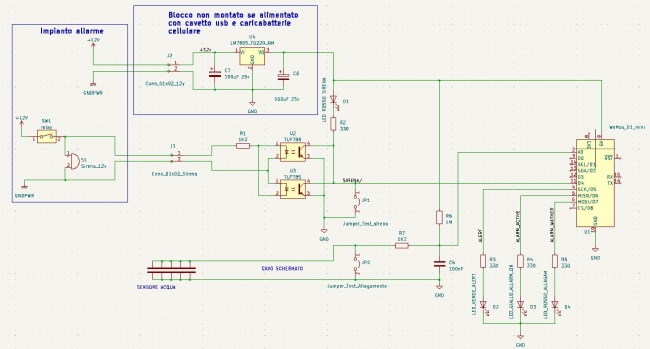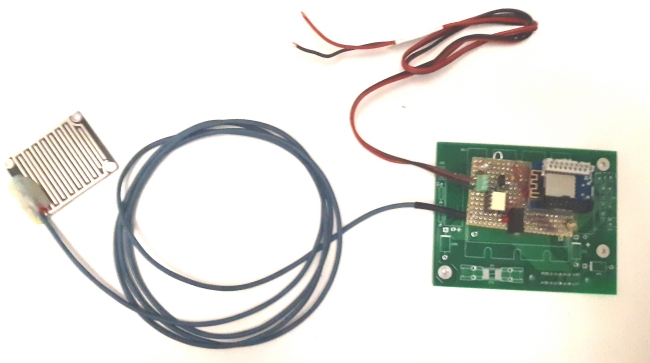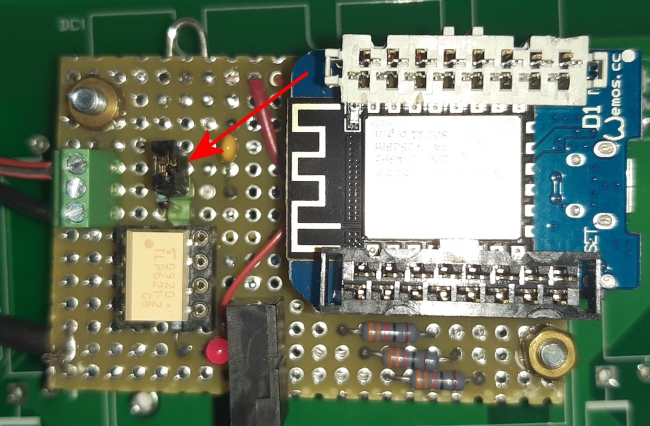Receiving a notification on our smartphone indicating an alarm

WhatsApp Alarm Repeater
Receiving a notification on our smartphone indicating that the home alarm is sounding (or that an automatic machine has stopped and requires immediate assistance) is very convenient.Older security systems that had this function used a telephone dialer connected to the landline. Later, more modern systems integrated this function with a GSM system, with a SIM card that calls us. However, the risk is that when needed, we may have forgotten to top up the phone credit. If no data contract is in place (which is more expensive than pay-per-use), we are required to recharge every 12 months, and it's easy to forget.
Modern technologies give us an advantage: with an Esp8266 module costing only a few euros, we can, following an event, send a WhatsApp message to one or more numbers. It is also possible to differentiate messages for different events.
The sketch, encoded as RMT8266-WAPP-Vxx (where xx is the version), sends different messages to two WhatsApp numbers for the following events:
- System started
- System reconnected to WiFi
- Alarm started
- Alarm repeated every minute
- Alarm ended
- Flood sensor activated
- Flood alert repeated every minute
- Flood alert ended
- System alert every 24 hours
You need to activate the WhatsApp server, which will send us the messages:
- Add a new contact to your address book, named (for example) WHATSAPP_SERVER with phone number +34 644 43 38 04
- Send the following message on WhatsApp to that number: "I allow callmebot to send me messages" (without quotes)
- You will receive an activation code, called APIKEY: CallMeBot API Activated for 39329*****40
Your apikey is: 26****8
You can now send messages using the API.
https://api.callmebot.com/whatsapp.php?phone=393*****940&text=This+is+a+test&apikey=26****8
Send Stop to pause the Bot.
Send Resume to enable it again.
Activation of the board (ESP8266_ON_WAPP_29 sketch version)
- Connect the system to a PC with a USB cable
- Open Arduino IDE (example version 1.8)
- Find the new COM port that appears and select it
- Open Serial Monitor and set it to 115200 baud
- Reset the WEMOS MINI D1 using the side button
- Within 5 seconds, send a character from the terminal
ESP8266_ON_WAPP_29 Version
Press CR within 5 seconds to change parameters
1 2 3 4 5
- The menu opens:
|************************|
| ʘ‿ʘ Menu (◡_◡) |
| Ver. ESP8266_ON_WAPP_29
|************************|
0 Reset
1 Set Flood Threshold
2 Set WiFi Ssid
3 Set WiFi Password
4 Set Phone1
5 Set ApiKey1
6 Set Phone2
7 Set ApiKey2
8 Set Alarm Message
11 Type variables in RAM
12 Enable watchdog test
13 Erase EEprom
14 WiFi Scanner
15 Test 3 LEDs
16 Test siren input
17 Test flood input
18 Test WhatsApp message sending
19 Test WiFi connection
99 Return to loop without reset
Essential commands to run upon first activation:
1) Read flood sensor when the sensor is dry. The value is saved automatically. It should be around 200 bits; if it's near zero, a 1M-ohm pull-up resistor is missing on the A0 pin connected to the sensor.
2) Set your router's WiFi SSID
3) Set WiFi password
4) Enter phone number in the format +393331234567
5) Set the received ApiKey
6) Set the second phone number (if available, otherwise enter 0)
7) Set the ApiKey for the second phone number (if available, otherwise enter 0)
8) Set a custom alarm message, max 60 characters
19) Test the WiFi connection (a board reset may be needed to connect automatically)
CONNECTION TO THE SYSTEM
Connect the two conductors in parallel to the 12-volt siren
Power the system with the USB cable and a 5v 1Amp mobile charger (Samsung type)
Once connected to WiFi, it's possible to test sending an alarm through the mini jumper by closing the two pins.
Flooding can be simulated by touching the PCB coil with a moistened finger
CIRCUIT DIAGRAM
LED MEANINGS
- BLUE LED on WEMOS = LED-WIFI
- RED LED on flood sensor = LED-WATER
- Tri-color LED on board
- GREEN Tri-color = ALERT-LED
- YELLOW Tri-color = SIREN-ON LED
- RED Tri-color = WATER LED
- RED LED on board = SIREN-ON LED
START-UP SEQUENCE
- No LED is on; as soon as it starts searching for WiFi, the BLUE-WIFI LED blinks. If it doesn't connect, it keeps blinking.
If it connects, the BLUE-WIFI LED stays on solid, and a SYSTEM STARTED WhatsApp message and a WIFI-CONNECTED message are sent.
If the connection is lost, it starts blinking again while waiting to reconnect.
Once reconnected, a WIFI-CONNECTED WhatsApp message is sent.
- When connected, the green ALERT-LED starts blinking once per second.
- If the sensor is wet, the WATER LED lights up on both the sensor and the tri-color LED and remains on until dried. During this time, a FLOOD ALARM WhatsApp message is sent every minute. Once dried, a FLOOD END message is sent.
- If the siren sounds (or is simulated by inserting the mini-jumper), the yellow SIREN LED on the tri-color and the red LED near the mini-jumper light up and stay on until the siren stops. During this time, a customizable SIREN ALARM message is sent every minute.
Once stopped, an END OF ALARM message is sent.
WHATSAPP MESSAGES
DEBUG SERIAL MONITOR
CONTACT ME FOR MORE INFO


Categorie Articoli
Come-Trovare-Facilmente-l-Equivalente-di-un-Transistor
Corso-di-elettrotecnica-ed-elettronica-3-volumi
Libro-tutto-sull-audio---inglese
Libro-ELETTRONICA-FONDAMENTALE
Dove-acquistare-abbigliamento-risparmiando
Come-vedere-le-partite-sullo-smartphone
Come-difendersi-dagli-allegati-pericolosi-nelle-email
KEEPASS-un-posto-sicuro-per-le-nostre-PASSWORD
I-3-trend-estivi-del-2020-scopri-i-tagli-che-ti-stanno-meglio
Ultimi articoli
Come-copiare-1-TB-di-dati-su-WINDOWS APRI
Parallelatore-Camper APRI
Come-Trovare-Facilmente-l-Equivalente-di-un-Transistor APRI
Delaying-the-Switch-to-LPG APRI
Ritardare-la-commutazione-a-GPL APRI
OPTA-FINDER-ARDUINO-COMPATIBLE APRI
whatsapp-alarm-repeater APRI
Arduino_Template_Menu_Eng APRI
Arduino_Template_Menu APRI
Power-Supply-with-Current-Control APRI
Vantaggi_Alimentatori-Controllo_Corrente APRI
Camping-La-Secca-Moneglia APRI
Safety-Relays APRI
Rele-di-sicurezza APRI
Internal-or-External-Watchdog APRI
Watchdog-interno-o-esterno APRI
Ripetitore-di-allarme-su-Whatsapp APRI
Bufala-in-crosta APRI
Home-Automation-ESPeriment APRI
ESPerimento-Domotica APRI
Arduino-measures-liquid-level APRI
Arduino-misura-livello-liquidi APRI
finder APRI
LORA-english-version APRI
Pluviometro-LORA APRI
Pillole_di_Promessi_Sposi APRI
LORA APRI
promessisposi-riscrittura APRI
Arduino_crashes APRI
Arduino_si_blocca APRI